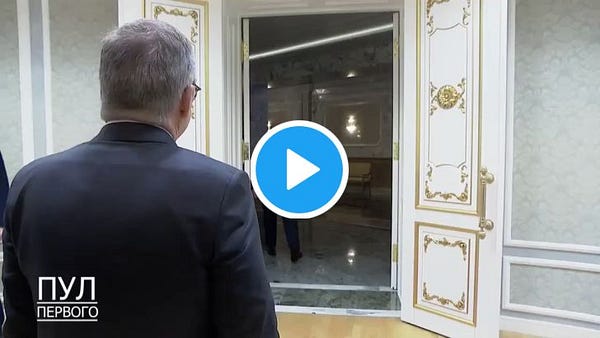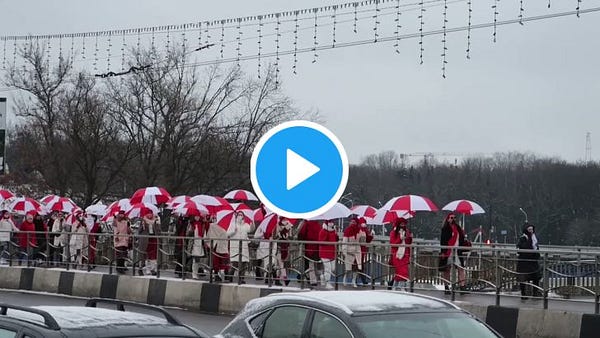January 15, 2021
European current affairs // I S S U E 4 // V O I C E S
The week started with a handshake, followed by a hug.
René Fasel is a head shorter than Belarusian dictator Alexander Lukashenko. The International Ice Hockey Federation's Swiss-born president had to stand on his toes to embrace the man that has been ruling the Eastern European country for 26 years—and whose regime has been called a 'reign of terror.'
Fasel was in the Belarusian capital Minsk on Monday to discuss the 2021 Ice Hockey World Championship, cohosted by Minsk, and by Riga, Latvia's capital, from May 21 to June 6 this year. The International Ice Hockey Federation has come under increasing pressure after Latvia called for the event to be removed from Belarus entirely as Lukashenko's regime cracked down on peaceful protesters.
The Belarusian opposition sees Fasel's kiss as another sign of fellow-Europeans not doing enough to stand up for democracy.
Hugs and other displays of affection, can go down in history as icons of their time.
In 1979, a photograph of Eastern Germany's leader Erich Honecker and Soviet President Leonid Brezhnev became emblematic for the Soviet world. In the picture by Régis Bossu, one sees the two leaders kissing each other on the mouth—performing the Soviet fraternal kiss—celebrating the 30th anniversary of the German Democratic Republic of East Germany. The picture symbolized the power and cohesion of the Soviet Bloc and became an icon of the Cold War itself.
More than forty years later, it is doubtful what place in history Fasel wants to claim for himself by hugging the Belarusian president.*
Lukashenko is widely regarded as the last dictator of Europe and a relic of the Soviet world. He has been facing peaceful protests for months after getting reelected in polls many believed were rigged. In total, more than 30,000 people have been imprisoned since demonstrations started in August 2020. According to the human rights center Viasna, 381 people were beaten in detention, 482 hospitalized, and more than 160 people were convicted in politically motivated criminal cases.
The European Union accuses Lukashenko of election fraud and repression. Its Member States stopped recognizing him as the legitimate president of Belarus and imposed sanctions against dozens of Belarusian officials.
With his regime more and more isolated, Alexander Lukashenko aims to seize the moment to rehabilitate his international standing.
Tikhanovskaya told German newspaper Süddeutsche Zeitung, Lukashenko's reign could be over by the spring.
The Belarusian opposition sees Fasel's hug as another sign of fellow-Europeans not doing enough to stand up for democracy.
Belarusian opposition leader Svetlana Tikhanovskaya has urged the EU and European leaders to "be braver" to support the protestors and to develop "unconventional ways" to help push Alexander Lukashenko from power.
Despite months of peaceful protests, the Belarusian strongman has been capable of clinging to power, assisted by a network of spies and informants who oversee every establishment in the country, from schools and businesses to the presidential administration. Its agents collect compromising materials on almost anyone suspected of disloyalty — Pavel Latushko, a former culture minister, told the New York Times.
This system spurs Lukashenko's confidence. During the Minsk meeting on Monday, he told René Fasel that the protests in his country would not make it unsafe for Belarus to host the tournament. He even offered to host it without cohost Latvia.
One could read Lukashenko's comment as mocking the protests that have become a ritual, integrated into people's daily lives. You can see parades of people in Belarus, young and old, men and women, walking the snowy streets every night, facing the Belarusian's winter's cold, chanting songs.
The protests are not as massive as they were last summer when hundreds of thousands of people went to the streets, but they appear to keep the opposition's spirit lit.
It takes around 3.5% of the people actively participating in peaceful protests to ensure serious political change.
Tikhanovskaya told German newspaper Süddeutsche Zeitung, Lukashenko's reign could be over by the spring. "I can't predict the future. What matters is the will of the people. I think we can win by spring. But who knows: it might happen next week."
According to a political scientist at Harvard University, Erica Chenoweth, who studied hundreds of non-violent campaigns over the last century, it takes around 3.5% of the people actively participating in peaceful protests to ensure serious political change. That would mean that about 330.000 of the population of 9.5 million should participate in Belarus's demonstrations. Belarus probably already hit that number last summer.
Participation of the 3.5% is significant because it helps win support among the police and the military — the very groups the government needs to bring about order. Suppose roughly 3.5% of the population participates in protests. In that case, the members of security forces may be more likely to worry that their family members or friends are in the crowd — making it more probable that they fail to crack down on the campaign.
The question is how the protests in Belarus will regain momentum to rebuild the critical mass we saw last summer. If the Ice Hockey Championship is held in Minsk, Belarus's political situation may, once again, draw the attention of political leaders and journalists worldwide. The world's watching eye might motivate more Belarusians to hit the streets and withstand Lukashenko's threats.
Some campaigns fade and die when they fail to secure critical mass and when the international community has ignored them for too long. That's why some back up from Europe might be useful, Tikhanovskaya said: "The voice of Europe has so far, not been powerful."
*Declaration by René Fasel and the IIHF:
In a Q&A on the International Ice Hockey Federation's (IIHF) website René Fasel says he asked Lukashenko to find peaceful solutions towards improving the socio-political situation within Belarus. Fasel acknowledges the visit gave a negative impression but assures the meeting was taken in a serious tone. The IIHF’s president did not speak to the opposition, but he says the IIHF is ready for dialogue with the opposition. He welcomes a chance to see if the IIHF can help improve the situation in Belarus.
Notes and further reading:
On the photograph by Régis Bossu (Rare Historical Photos).
Belarus leader defends hosting hockey championship (AP).
On Lukashenko’s network of spies (the New York Times).
On the 3.5% rule of Erica Chenoweth (BBC).
Tikhanovskaya is confident it can be over by the spring (Politico Europe/Süddeutsche Zeitung).
Tikhanovskaya calls on the EU to be brave. (Politico Europe)
Tweets:








Photo by Radek Homola on Unsplash.









